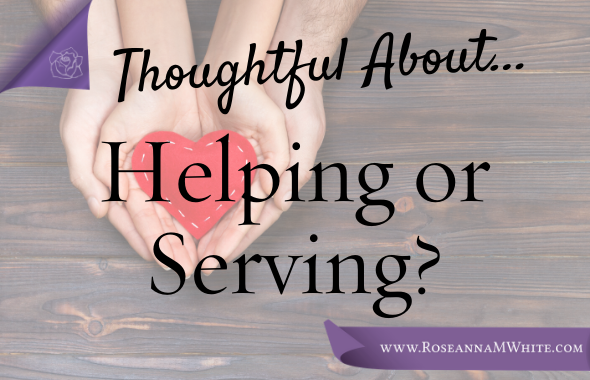
Helping or Serving?

In the church today, we hear a lot about helping others. Volunteering. Making sandwiches, serving at a soup kitchen, that sort of thing. “Help those less fortunate than you” is a phrase I’ve heard for years. And the work—the work is good! Necessary.
But something about how I hear some people talk about it has been rubbing me wrong, and it’s taken me quite a while to really put my finger on it. If I even have, LOL. And I think it comes down to this: many times when I hear this, it sounds like someone is saying, “I have and you don’t, so I’ll help you out. You’ll benefit, and I’ll feel good for having helped.”
That is really what gets to me. That I’ll feel good about it thing. I’m not entirely sure why it rubs me wrong—because yes, of course when we’re doing God’s work it’ll put joy in our hearts. But I guess I want to make sure I’m not doing good works because it makes me feel good. I’m not helping others because of what it does for me. Or even because I’m “supposed to.”
As I talked through this with my husband a while back, I tried to pinpoint the difference between helping—you know, “helping those who are less fortunate”—and serving. Perhaps I’m nitpicking or drawing an arbitrary distinction, but here’s the difference as I’m defining it.
When people want to help, they want to offer what they have to “those who…” But by thinking of it like that, they’re drawing a distinction. The Haves and the Have Nots. The Us and the Them. There are the Less Fortunate and the More Fortunate. And both parties are expected to know who is who—and never to forget it. I helped you.
Serving, on the other hand, removes those barriers. More, it switches them. Serving is Jesus washing the disciples’ feet. Serving is the spirit-filled men of Acts making sure everyone gets dinner. Serving is humbling yourself, lowering yourself, and putting the one being served above you. Serving is when you say, “We’re the same, you and I. God loves us both the same.” Or even, “Forgive me for not doing this sooner.”
Of course, the funny thing is that the exact same action could be taken, and it could be either what I’m calling helping or serving. It’s the heart of the worker that makes the difference—and the attitude we take.
But it’s a crucial distinction. I’ve read a few articles in the past few years about “humanitarian tourism,” which is basically people who volunteer with some relief organization just to spend a few weeks seeing what’s going on. They go in, think they’re helping, and go home feeling good about themselves for seeing how the “less fortunate” live and making it a little better. But they don’t. According to these articles I’ve read, many times these “tourists” do more harm than good. Professionals have to go in behind them and undo their mistakes, redo their work. And you also end up with things like state-of-the-art kitchens in brand-new facilities…but no food to put in them.
Then I think of missions. On the surface, these groups look very similar. But long-term missionaries aren’t out for that “feel good” experience. They know when they sign up for it that it’s work. And more, that it’s work for a purpose beyond the physical, though the physical will be included. It’s about really living with the groups they’re ministering to—serving them, loving them, learning their ways, and telling them about the God who created them and sent His Son to die for them.
I think this perfectly showcases the difference I’m trying to highlight here. Anyone can HELP. But SERVING is something different. Serving is embracing the upside-down Kingdom of God, recognizing that the last—those living on the streets or starving in a third-world country—are the FIRST. And if they’re the first, then it’s right and natural for us to humble ourselves before them and serve them. Not as the rich Americans deigning to give a little of our time or effort or money. But as slaves of Christ, recognizing that He has called us to take the lowest seat, the bottom rung, and say “I’m no richer than my poorest brother.”
For the last seven months, my family has been doing a daily devotional called Common Prayer: A Liturgy for Ordinary Radicals. There are occasionally things in there that we don’t quite see the purpose of having been included…but there are also a lot quotes and insights that make us sit back and look at the world around us in a whole new way. And one of those was at the beginning of the book, where the authors quote an early Christian father who said we shouldn’t just give a coat to someone in need—we should fall to our knees at their feet and beg their forgiveness for having not seen their need before, for having extra when they had nothing.
Beg their forgiveness. That really is a radical thought for the Church today, isn’t it? We’re happy enough to quote the parts of the Gospels where Jesus says, “As you do unto the least of these…” But do we take it a step further and recognize that not doing it is sin? Sin we need to beg forgiveness for?
I’m still working on this—it requires changing a whole mindset, not to mention habits. But it’s an understanding that I need to develop. Because I don’t want to be one of the people who “does good” just to feel good. I want to be one of the people who serves others because Christ first served me.











 Roseanna M. White is a bestselling, Christy Award winning author who has long claimed that words are the air she breathes. When not writing fiction, she’s homeschooling her two kids, editing, designing book covers, and pretending her house will clean itself. Roseanna is the author of a slew of historical novels that span several continents and thousands of years. Spies and war and mayhem always seem to find their way into her books…to offset her real life, which is blessedly ordinary.
Roseanna M. White is a bestselling, Christy Award winning author who has long claimed that words are the air she breathes. When not writing fiction, she’s homeschooling her two kids, editing, designing book covers, and pretending her house will clean itself. Roseanna is the author of a slew of historical novels that span several continents and thousands of years. Spies and war and mayhem always seem to find their way into her books…to offset her real life, which is blessedly ordinary.